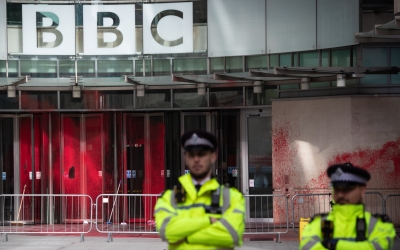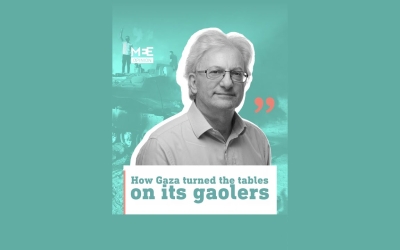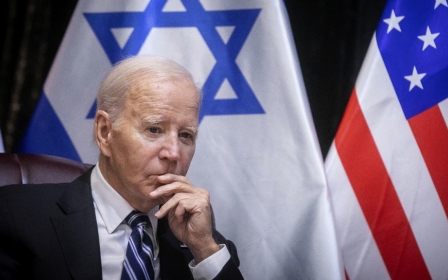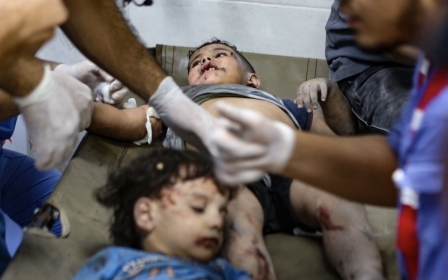Israel-Palestine war: How US media legitimise Israel's barbarism against the Palestinians
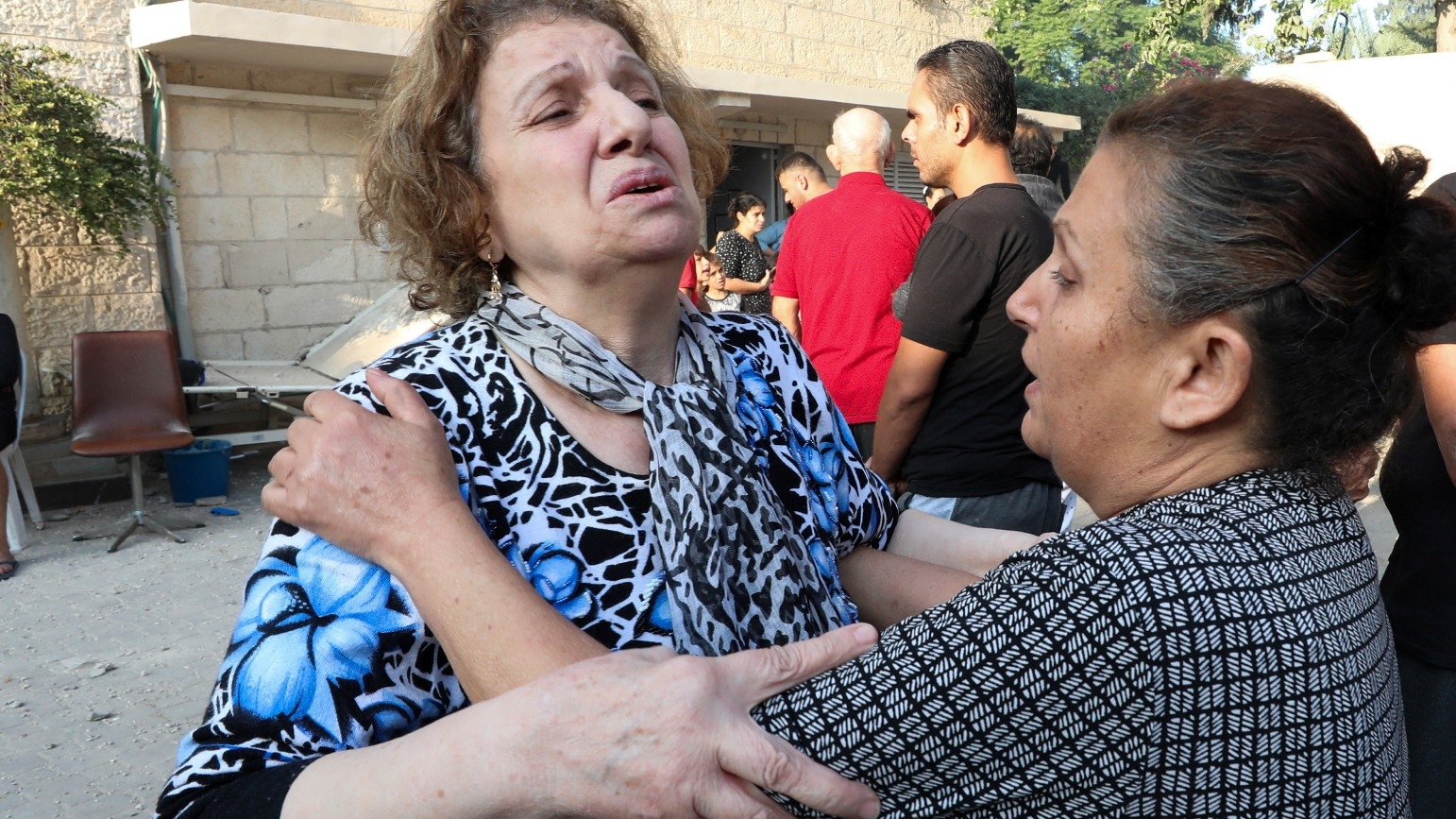
Recent editorials in leading liberal US newspapers have consistently presented the unrelenting mass terror that Israel inflicts on Palestinians as legitimate.
Media outlets have endorsed Israel's assault on Gaza, and America's funding of the attack, while criticising those who offer even mildly dissenting views. American publications have repeatedly conferred on Israel's violence a virtuousness, even as it mows people down - a generosity not afforded to its Palestinian counterpart.
On 12 October, The Washington Post ran an editorial praising US President Joe Biden for his "unreserved condemnation of Hamas's terrorism", saying: "In that respect, Mr Biden's firm words also stand in welcome contrast to the equivocations by a small number of the left-wing members of Congress in his own party, which White House press secretary Karine Jean-Pierre specifically repudiated."
The link to Jean-Pierre's words indicates that the "equivocations" the Post objects to are statements that "suggested the Hamas attack on Israel should be considered in context with previous actions by Israel", as well as those that "opposed US military aid for Israel on social media and called for an immediate cease-fire in the conflict."
A day before that editorial was published, the human rights groups Mezan, al-Haq, and the Palestinian Centre for Human Rights jointly documented that, just in the period between midday 10 and 11 October, Israel destroyed entire neighbourhoods of al-Qarm, Ezbet Abdrabbo, and al-Sikka, with rescue teams "recover[ing] dozens of bodies" while "others are still under the rubble"; "target[ed]" Gaza's Islamic University and bombed the Al-Fakhoura Scholarship Program building", assaults that combined to kill 57 Palestinians, including 20 children. They further noted Israel's air strikes and shelling of the Middle Area District's agricultural lands and "residential areas, most notably in the three densely populated refugee camps of Al-Bureij, Al-Nusairat, and Deir al-Balah", killing at least 49 Palestinians, 15 of them children.
New MEE newsletter: Jerusalem Dispatch
Sign up to get the latest insights and analysis on Israel-Palestine, alongside Turkey Unpacked and other MEE newsletters
Follow Middle East Eye's live coverage for all the latest on the Israel-Palestine war
For the Post, "equivocati[ng]" about whether the US should fund such atrocities, or try to bring them to an end through a ceasefire, is "[un]welcome".
Rationalising 'genocidal' language
In its most recent editorial, the Post professes concern for the Palestinians but still endorses Israel's military campaign: "After the slaughter of its civilians, Israel - like any other state - has every right to respond militarily."
For the Post, the violence of the occupier is just and that of the occupied isn't: Israel can "respond militarily" to Palestinian forces killing Israelis but Palestinians don't have the same right, even after 75 years of ethnic cleansing, even under apartheid.
A 14 October New York Times editorial strongly supports Israel's attacks, saying that Israel "is determined to break the power of Hamas, and in that effort it deserves the support of the United States and the rest of the world." The authors go on to say that "Ending Hamas's control over Gaza is an essential step".
The New York Times's editorial is infused with qualifiers like Israel "should not lose sight of its commitment to safeguard those who have not taken up arms".
The editorial board contradicts its own claims about Israel's supposed "commitment" to protecting civilians by citing Israeli Defence Minister Yoav Gallant calling Palestinians "human animals", which the authors rationalise by saying that the remark occurs "in an atmosphere of intense emotion".
Of course, Gallant isn't the only Israeli official to use genocidal language since the escalation of their war on Palestine. Israeli military spokesperson Rear Admiral Daniel Hagari said that Israel had dropped "hundreds of tons of bombs" on Gaza and that "the emphasis is on damage and not on accuracy".
Israeli President Isaac Herzog said: "It is an entire nation out there that is responsible. It's not true this rhetoric about civilians not aware, not involved. It's absolutely not true." He added: "We are defending our homes, we are protecting our homes, that's the truth, and when a nation protects its home it fights and we will fight until we break their backbone."
Not only have Israeli leaders repeatedly signalled that they have no intention of "safeguard[ing]" non-combatants, but Israel has deliberately slaughtered them on a mass scale.
For instance, a day prior to the editorial's publication, the award-winning human rights group Defence for Children International Palestine reported that Israel had killed almost 600 Palestinian children to that point in its onslaught against Gaza, a third of the overall death toll.
Outlandish assertions
Even as Israel eschews any commitment to protecting civilians in both word and deed, The New York Times repeatedly contrasts Israeli military policy favourably with that of the Palestinian forces, writing that "Israel is preparing to send its young men and women into battle, where they will face an enemy that does not respect the same rules of warfare that they have committed to."
These fantasies about Israel's supposed non-targeting of civilians and its allegedly humane 'values' present all of its cruelty - the merciless killing, the sadism of the siege - as well-meaning mishaps
Saying that Israeli state violence is morally superior to Palestinian resistance groups carries the clear message that the former is legitimate while the latter is not.
The Times made the outlandish assertion that "What Israel is fighting to defend is a society that values human life and the rule of law."
Since no such assertion is made about Palestinian "values", the message is that slaughtering Palestinians is legitimate: if Palestinian society (or significant portions thereof) values murderous criminality, then the implication is that it's desirable for them to be wiped out by a supposedly more civilised force.
Meanwhile, two days before the editorial went to press, Human Rights Watch (HRW) said Israel had used white phosphorous - which, upon contact, can "burn people, thermally and chemically, down to the bone" - over both Gaza City's port and rural areas along the Israel-Lebanon armistice line.
HRW said that using white phosphorous in Gaza, one of the most densely populated areas in the world, "magnifies the risk to civilians and violates the international humanitarian law prohibition on putting civilians at unnecessary risk".
As HRW noted, Israel also used this weapon in Gaza in 2009 and, during the current round of fighting, Israel has "cut electricity, water, fuel and food into Gaza in violation of the international humanitarian law prohibition against collective punishment."
For "a society that values human life and the rule of law", Israel does an awful lot of human-life taking and law-breaking.
An ethical veneer
Similarly, The Los Angeles Times declared that "Israel has every right to use military force to prevent" attacks like the ones that Hamas carried out on 7 October and that Israel "must stay true to its values by doing everything possible to minimize the suffering of innocent Palestinian residents of Gaza."
The piece applauds Biden for saying he will ask Congress for "an unprecedented support package for Israel's defense" and for vaguely suggesting that Israel reflect on whether killing thousands of Palestinians will help it "achieve [its] objectives".
The editorial then asserts: "That Israel does not target civilians is small comfort for the families of those killed or wounded."
Perhaps the authors think it magnanimous to mention the 3,000-some Palestinian lives Israel has snuffed out in 11 days. But such sympathies are worse than useless when they are packaged with a lie that rationalises all the killing and creates alibies for all the killing to come: for instance, two days before the editorial, the United Nations Office for the Coordination of Humanitarian Affairs (OCHA) noted:
"Multiple residential buildings in densely populated areas have been targeted and destroyed” by Israel, including a “residential building in Jabalia, northern Gaza, where ten Palestinians were killed; a residential building in the Musabah area of Rafah, where at least 11 Palestinians, including women and children, were killed; and a charity organization’s building in Rafah, where 11 Palestinians were killed, and several others were injured. On 16 October, in the morning, Israeli forces reportedly targeted a residential building in Khan Yunis, killing 22 Palestinians."
Furthermore, on 15 October, the World Health Organisation (WHO) stated: "Four hospitals in northern Gaza are no longer functioning as a result of damaging and targeting. 21 hospitals in the Gaza Strip have received instructions from Israeli forces to evacuate. The WHO reiterates that all precautions must be taken to protect health workers and health facilities, including patients and civilians sheltering in them."
These fantasies about Israel's supposed non-targeting of civilians and its allegedly humane "values" present all of its cruelty - the merciless killing, the gruesome physical and psychic wounds, the sadism of the siege - as well-meaning mishaps en route to a just cause; it is rhetoric intended to mask Israeli brutality with an ethical veneer.
But colonial violence is Israel's cause. The violence of dispossession, torture, and massacre after massacre after massacre. Because no ethno-state in which Palestinians remain a persecuted minority in their homeland is possible without ruthless, incessant violence.
By presenting all that barbarism as if it were defensible, the US media are doing their part to help it continue.
The views expressed in this article belong to the author and do not necessarily reflect the editorial policy of Middle East Eye.
Middle East Eye delivers independent and unrivalled coverage and analysis of the Middle East, North Africa and beyond. To learn more about republishing this content and the associated fees, please fill out this form. More about MEE can be found here.



